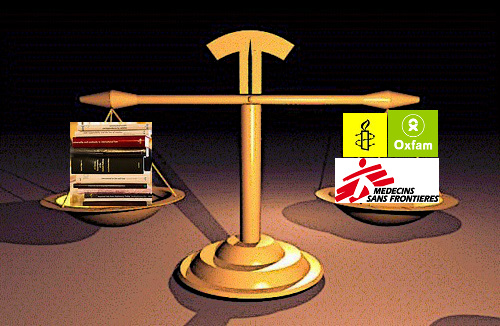International non-governmental organizations (iNGOs) benefit under international law. From lobbying states, to beseeching larger organizations such as the United Nations to hold states accountable, iNGOs are able to make changes in the world.
But can smaller iNGOs make as much of a difference as larger iNGOs? It seems to be a case of money versus access and accountability.
Julia Smith, a political science instructor at Kwantlen Polytechnic University has worked for several smaller iNGOs and has first-hand experience with the benefits of working with iNGOs of more limited means.
“Being a smaller NGO, you can go more places. You don’t have as many operating procedures, you don’t have as much bureaucracy,” Smith says. “Also, you usually are more connected with the local community. You have a certain amount of security just by being connected.”
That grassroots, flexible approach allowed Smith and those she worked with to give street children in Kenya temporary reprieve from a corrupt police force. According to Smith, police would round up children who had no criminal charges against them and place them in a single holding cell, regardless of age, often with adults who would, alongside police officials, abuse them.
“If they were children that we knew, and we knew they were in jail we could go and try to negotiate with the police officers to release the child… mostly it was just a presence. We would just go and stand in their office.” These are the perks of smaller iNGOs, as opposed to the restrictions placed on larger iNGOs under law. But it’s not all perks.
There is the challenge of funding to deal with. Uncertainty comes with the territory. Smaller grants, constant re-application for grants and fewer sources for funding, Smith says, are challenges smaller iNGOs face. She says there are things that larger iNGOs can accomplish that a grassroots organization simply can’t.
“Whenever you’re doing international aid work, there are so many bigger issues going on, you can only achieve so much,” says Smith. When she worked with the Livelihood Project in Sierra Leone, Smith spoke to locals in the area to find out what they needed most to improve economic development.
“The number one thing people said was ‘we need a better road.’ This was not something we could do. It wasn’t in the mandate of my organization.” And even when the smaller iNGO is able to help locals, it is not always powerful enough to.
As is often the case, a larger iNGO may offer more, seemingly better options than its smaller counterpart. Lacking their own infrastructure, the citizens of Sierra Leone badly needed economic aid. The group Smith worked with moved in to provide small commercial banks and credit unions, and to offer small loans based on a sustainable model.
The United Nations Food and Agriculture Organization soon followed suit, coming in with its own banking model, promising bigger loans faster, but at higher interest rates. Two years after the UN entered the scene, it left, says Smith, leaving behind the smaller iNGOs to clean up the mess. Though the United Nations is often praised for its good work in humanitarian aid, in some cases at least it lacks the grassroots approach to understanding the needs of people they are trying to help.
* * *
In part three of this series, we’ll take a closer look at the United Nations and its partner NGOs, with a focus on how closely tied to the politics of the international system each is.




Chris Yee
Great article, Kristen, even though (or especially because!) if it raised more questions than it answered about Ms. Smith’s experiences with her iNGO work.